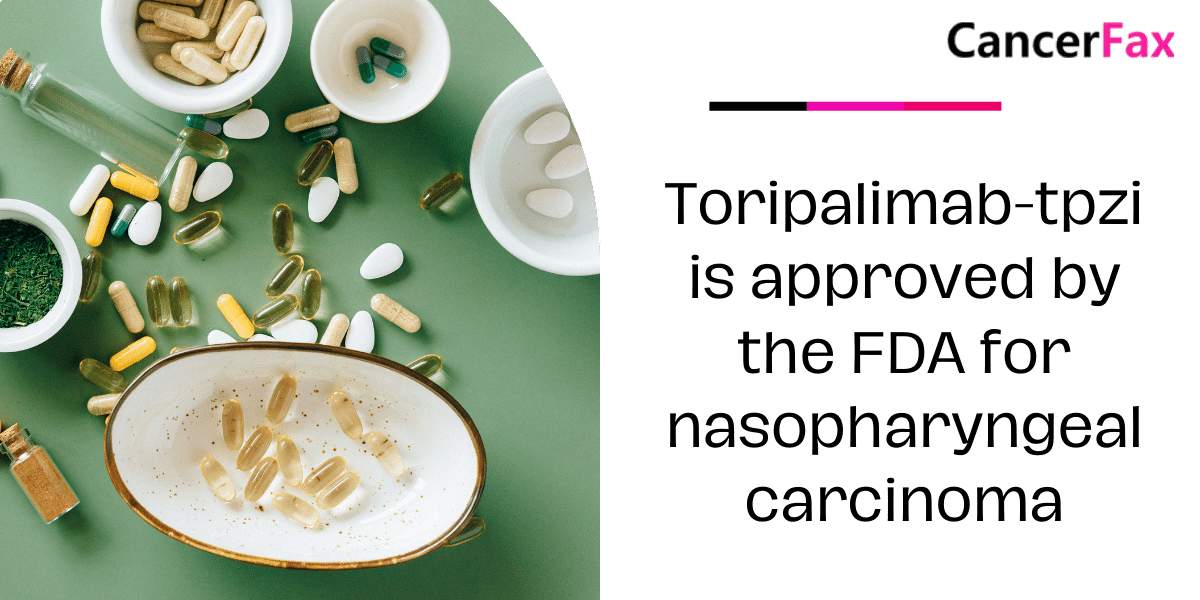In October 2023, the FDA approved toripalimab-tpzi (LOQTORZ, Coherus BioSciences, Inc.) with cisplatin and gemcitabine as the first-line treatment for people with locally advanced nasopharyngeal cancer (NPC) that has spread or come back. The FDA has approved toripalimab-tpzi as a single treatment for adults with recurrent unresectable or metastatic NPC that progressed during or after platinum-containing chemotherapy.
The efficacy of toripalimab-tpzi with cisplatin and gemcitabine was assessed in JUPITER-02 (NCT03581786), a randomized, multicenter, single region, double-blind, placebo-controlled trial of 289 patients with metastatic or recurrent, locally advanced NPC who had not previously received systemic chemotherapy for recurrent or metastatic disease. Patients were randomly assigned (1:1) to receive toripalimab-tpzi with cisplatin and gemcitabine, followed by toripalimab-tpzi, or placebo with cisplatin and gemcitabine, followed by placebo. For complete prescribing information on chemotherapy regimens, please see the link above.
The key effectiveness outcome measure was progression-free survival (PFS), as determined by a Blinded Independent Review Committee (BIRC) using the RECIST v1.1. Overall survival (OS) was another outcome. The toripalimab-tpzi combination showed a statistically significant improvement in PFS, with a median PFS of 11.7 months versus 8.0 months (hazard ratio [HR] 0.52 [95% CI: 0.36, 0.74], p-value=0.0003). A statistically significant improvement in OS was also seen, with median OS not attained (95% CI: 38.7 months, not estimable) for the toripalimab-tpzi-containing regimen and 33.7 months (95% CI: 27.0, 44.2) for the placebo-containing regimen (HR 0.63 [95% CI: 0.45, 0.89], p=0.0083).
POLARIS-02 (NCT02915432) was an open-label, multicenter, single country, multicohort trial in 172 patients with unresectable or metastatic NPC who had received prior platinum-based chemotherapy or had disease progression within 6 months of completion of platinum-based chemotherapy administered as neoadjuvant, adjuvant, or definitive chemoradiation treatment for locally advanced disease. Patients were given toripalimab-tpzi until disease progression by RECIST v1.1 or intolerable toxicity.
The key efficacy outcome measures were confirmed overall response rate (ORR) and duration of response (DOR), as determined by BIRC using RECIST v1.1. The ORR was 21% (95% CI: 15, 28), with a median DOR of 14.9 months (95% CI: 10.3, not estimable).
Toripalimab-tpzi resulted in immune-mediated adverse responses such as pneumonitis, colitis, hepatitis, endocrinopathies, nephritis with renal failure, and skin reactions. Toripalimab-tpzi with cisplatin and gemcitabine caused the most common adverse reactions (≥20%), including nausea, vomiting, decreased appetite, constipation, hypothyroidism, rash, pyrexia, diarrhea, peripheral neuropathy, cough, musculoskeletal pain, upper respiratory infection, insomnia, dizziness, and malaise. Fatigue, hypothyroidism, and musculoskeletal discomfort were the most prevalent adverse effects (≥20%) reported with toripalimab-tpzi as a single drug.
The recommended dose of toripalimab-tpzi with cisplatin and gemcitabine is 240 mg every three weeks until disease progression, intolerable toxicity, or up to 24 months. The recommended dose of toripalimab-tpzi as a single treatment for previously treated NPC is 3 mg/kg every two weeks until disease progression or unacceptable toxicity.

Targeting FGFR4 and CD276 with CAR T-cells demonstrates a strong antitumor impact against children rhabdomyosarcoma
Chimeric antigen receptor (CAR) T-cells that specifically target Fibroblast Growth Factor Receptor 4 (FGFR4), a surface tyrosine receptor that is extensively expressed in rhabdomyosarcoma (RMS), are now undergoing clinical research. However, the effectiveness of these CAR T-cells may be hindered by tumor heterogeneity and inadequate activation. In this study, we present a method to enhance the co-stimulatory and targeting characteristics of a FGFR4 CAR through an optimization process. We substituted the hinge and transmembrane domain of CD8 as well as the 4-1BB co-stimulatory domain with the corresponding domains of CD28. The CARs produced exhibit heightened anti-tumor efficacy in multiple RMS xenograft models, with the exception of the RMS559 cell line, which is known for its aggressive nature.

